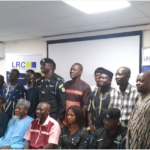
Ghana’s Chief Justice Anin Yeboah has called for the effective implementation of the Case Tracking System (CTS) activity nationwide.
He said stakeholders must ensure that the CTS activity was firmly rooted to enable efficiency and effectiveness in the criminal justice system, while promoting transparency and accountability at every stage of the process.
“As we seek the support of citizens, we as stakeholders must forge ahead with a common purpose to achieve the full implementation of the activity.”
Justice Yeboah made the call at a sensitization workshop on the CTS, on Thursday in Accra.
He said the CTS, launched in May 2018, sought to support government’s capacity to effectively investigate and prosecute criminal acts in a transparent and accountable manner.
“It is targeted at improving Ghana’s ability to track criminal cases from their introduction into the system to prosecuting the case in court, enhancing information sharing communication among Ghana’s law enforcement and judicial authorities.
It is also to increase efficiency and effectiveness of investigation of criminal cases of all types especially corruption, security and cyber crimes.”
He said since its launch, five thousand staff in all six Justice Service institutions had been trained to use the system in seven regions. Eighty-nine per cent of officers have commenced its use.
The CJ said the new system was a new initiative designed to improve the work of stakeholders and benefit the criminal justice system, and urged them to continue giving it their fullest commitment in order to ensure its complete roll out and sustainability.
“I urge you to continue to strengthen the collaboration and coordination to ensure that the task is done well despite the challenges.”
“Already there are genuine concerns about the long term sustainability of the system because of the usual drying up of funds, equipment, lack of follow-ups in the regions which may result from the withdrawal of focal persons, and the usual attitudinal resistance to change among others,”he said.
The CJ however noted that the challenges would be addressed if all stakeholders remained committed to the overall objective of the system given its obvious importance in addressing the major challenges in the criminal justice system.
Mr Enock Jengre, Rule of Law Specialist, said “access to justice means access to state sponsored health, welfare, education and legal services, particularly for the poor, or fair opportunities and treatment in the allocation and use of social, public services and goods.”
He said there were two avenues for access to justice including formal and informal avenues, as well as other avenues for administrative complaints.
He said some challenges in accessing justice service included high cost of initiating or defending suits, limited or no knowledge about legal rights and entitlement, or legal and social responsibilities, high perception of corruption, and executive or political interference, limited and ineffective real access to court, among others.
Mr Jengre said “the CTS looks at Tracking criminal cases from one justice sector institution to the other and there should be more lawyers to work with the Legal Aid Commission to defend people who could not afford the services of lawyers.
70 per cent of lawyers in the country are centred in the Greater Accra Region, while 20 per cent are in the Ashanti Region and the remaining 10 scattered across the rest of the regions, a situation which does not auger well for the judicial service system in the country.”
He said the Legal Aid Commission by virtue of Act 2018 was mandated to support persons who could not afford the services of lawyers, adding that the CTS would go a long way to help information flow among such institutions.
Mr Jengre applauded the regions using the system, saying “this is something that is quite useful and we cannot ignore it. So let us all support each other and advocate for it.”
Source: https://www.gna.org.gh/1.21119025





